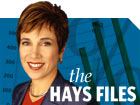
NEW YORK (CNN/Money) - Last fall, when I covered my first "CEO Academy" here in New York, the scandal at Enron had just started to break.
Most of the attendees at this one-day "finishing school" for new CEOs were reluctant to talk about it on camera. Too hot to handle.
Six months later it's a different story. WorldCom hit corporate America like a punch in the stomach. Just when people were hoping the "bad apples" had been ferreted out, along comes what appears to be the biggest corporate fraud in history. And the people here are sounding a bit furious about what many are calling "WorldCon."
The opinions of this group mean something. The academy is the brainchild of Dennis Carey and the G-100 Group, formerly known as the M&A Group. The faculty includes Jeff Immelt of GE, Raymond Gilmartin of Merck, and Bill Stravopolous of Dow Chemical.
"Somebody's got to go to jail," said M. Bruce Nelson, chairman and CEO of Office Depot, and one of the academy's 16 students. "But the abuses are just too much and they [hurt] credibility at the entire community."
Kevin Sharer, chairman and CEO of biotech heavyweight Amgen and Academy "professor," seemed aghast at the news.
"Ten years ago I worked at MCI [part of WorldCom], so my first reaction was personal," Sharer said. "I have friends there whose entire savings have been wiped out. I was also sickened and unhappy as a CEO -- it is just unconscionable."
How did it happen? What broke down? Sharer said, "The drive for earnings certainly had to be a part of it." And he said he's confident the new CEO, John Sidgemore, with whom he worked years ago at GE, will "figure it out."
I asked corporate governance expert Ira Millstein, one of the instructors at the Academy and senior partner at Weil, Gatshal & Manges, about the directors at these companies, whom many believe should have done more to stop the abuses.
Millstein said boards have to start doing their jobs, monitoring management, and watching compensation to see if it "incentivizes cheating or incentivizes performance."
This is tough for members of the boards of directors, Millstein said. "You have to be willing, when it is necessary, to go head on with management and to say, 'No, we are not going to compensate this way,' or, 'You're not performing well, you won't get the bonus,' or, 'You ought to be replaced,'" he said. "These are the tough jobs that boards are going to have to pay a lot more attention to."
Kathleen Hays co-anchors Money & Markets, airing Monday to Friday on CNNfn, and appears throughout the day reporting on the economy and how it affects financial markets. As part of CNN's Business News team, she is also a regular contributor to Lou Dobbs Moneyline.

|

